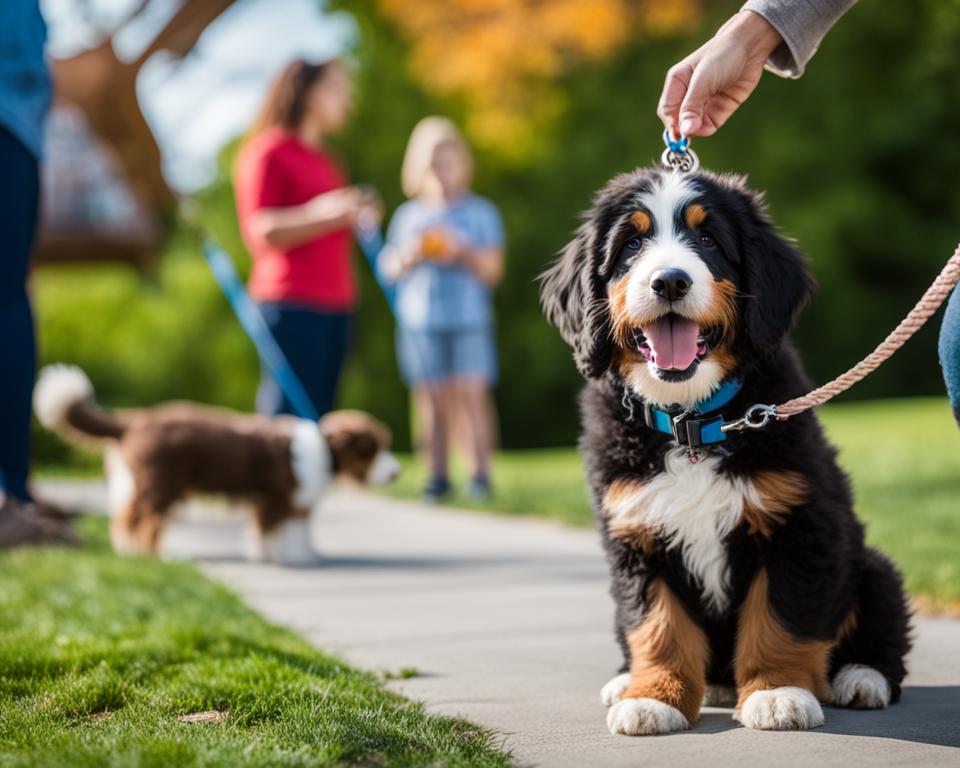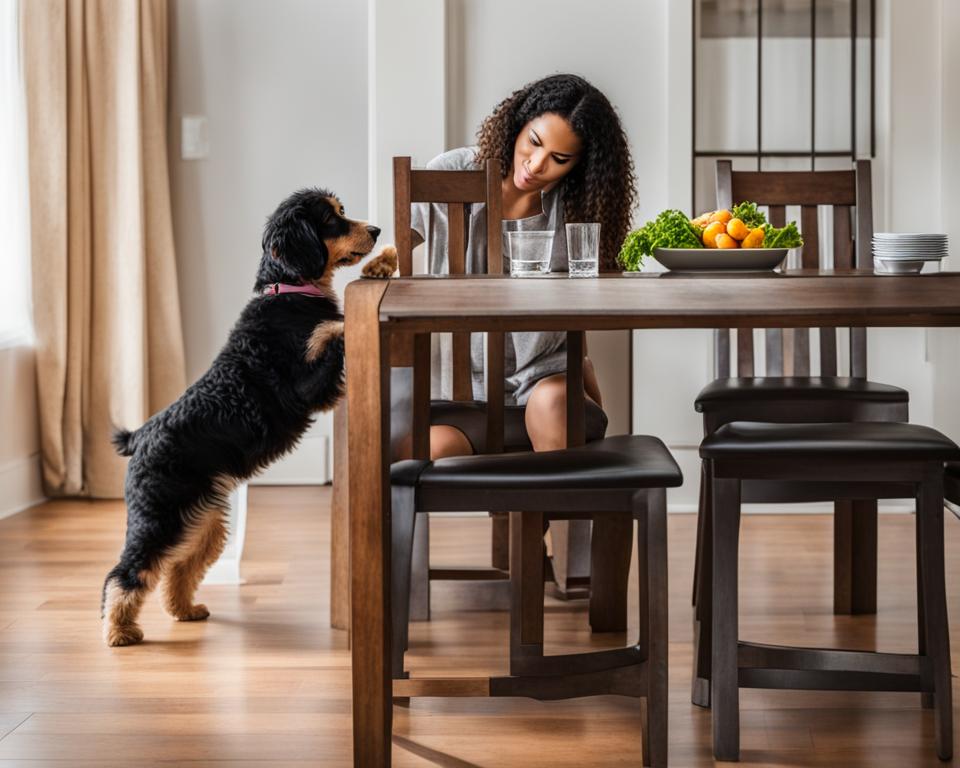Bernedoodles are a popular mixed breed that combine the best traits of Bernese Mountain Dogs and Poodles. These adorable companions come in various sizes and coat colors, making them a versatile and attractive choice for dog lovers. If you are considering adding a Bernedoodle puppy to your family, it’s essential to understand how to provide them with the care and training they need to thrive.
From puppy care and training to nutrition and grooming, this comprehensive guide will cover all aspects of raising a Bernedoodle puppy. Discover the key elements of their temperament, learn how to create an ideal living environment, and explore the necessary steps for their proper care and nutrition. Whether you are a first-time dog owner or have experience with other breeds, this guide will equip you with the knowledge and insights you need to raise a happy and healthy Bernedoodle.
Key Takeaways:
- Raising a Bernedoodle puppy requires attention to their care, training, and nutrition.
- Understanding the breed’s temperament is crucial for providing them with a suitable living environment.
- Regular veterinarian visits, proper diet, and dental care contribute to your Bernedoodle’s overall health.
- Training and socialization are essential for raising a well-behaved Bernedoodle puppy.
- Seeking professional help is beneficial when facing training challenges or behavior issues.
The Background and Characteristics of Bernedoodles
Bernedoodles are a designer breed that has gained popularity in recent years. They were created by cross-breeding a Standard Poodle with a Bernese Mountain Dog. This unique mix results in a dog that combines the intelligence and hypoallergenic qualities of a Poodle with the friendliness and loyalty of a Bernese Mountain Dog.
Bernedoodles come in different sizes, ranging from tiny to standard. The size of a Bernedoodle can vary depending on the size of the Poodle that was used in the breeding. The most common sizes are standard, mini, and tiny. Standard Bernedoodles can weigh between 70 to 90 pounds, while mini Bernedoodles weigh around 25 to 49 pounds, and tiny Bernedoodles weigh less than 25 pounds.
One of the most appealing features of Bernedoodles is their beautiful coat. They can have a variety of coat colors, including black, black and white, black and brown, or tri-colored. Additionally, Bernedoodles can have different coat types, ranging from curly to straight. Curly-coated Bernedoodles are typically hypoallergenic and shed less, making them a suitable option for people with allergies. On the other hand, straight-coated Bernedoodles may shed more.
| Size | Weight |
|---|---|
| Standard Bernedoodle | 70-90 pounds |
| Mini Bernedoodle | 25-49 pounds |
| Tiny Bernedoodle | Less than 25 pounds |
Overall, Bernedoodles are known for their friendly and loyal personalities. They are social dogs that enjoy being a part of the family and are great with children. Bernedoodles are intelligent and eager to please, making them highly trainable. Their temperament makes them well-suited for families, individuals, and even therapy work.
Creating an Ideal Environment for Your Bernedoodle Puppy
Bernedoodle puppies require a suitable living environment that caters to their exercise needs. Providing them with enough space to run and play is essential for their well-being and happiness. While tiny and mini Bernedoodles can adapt well to urban environments, medium to standard-sized Bernedoodles thrive in homes with access to a fenced-in yard or nearby park.
Regular exercise is crucial for Bernedoodles to maintain a healthy lifestyle. Daily walks and play sessions are recommended to keep them physically and mentally stimulated. Engaging in activities that challenge their intelligence and agility, such as puzzle toys or agility training, can also be beneficial.
It’s important to note that Bernedoodles are an active breed, and insufficient exercise can lead to behavioral issues or weight problems. Therefore, creating a routine that includes dedicated time for exercise is vital in providing your Bernedoodle puppy with a happy and fulfilling life.
| Living Environment | Exercise Needs |
|---|---|
| Urban Environment | Tiny and mini Bernedoodles can adapt well to urban environments where they have limited space to roam. Short walks and interactive indoor play can meet their exercise needs. |
| Suburban or Rural Environment | Medium to standard-sized Bernedoodles require more space to exercise. Access to a fenced-in yard or nearby park is ideal for them to run and play. Daily walks and engaging in mentally stimulating activities are necessary to keep them physically and mentally healthy. |
Benefits of Exercise for Bernedoodles:
- Prevents obesity and promotes a healthy weight
- Provides mental stimulation and prevents boredom
- Builds muscle strength and agility
- Supports cardiovascular health
- Helps to develop good behavior and social skills
By ensuring an ideal living environment and meeting their exercise needs, you can provide your Bernedoodle puppy with the best possible start in life. A well-exercised and mentally stimulated Bernedoodle will be a happy and content companion, ready to share many joyful moments with you.
Proper Care and Nutrition for Your Bernedoodle Puppy
Taking care of your Bernedoodle puppy involves a combination of regular veterinary visits, proper nutrition, and dental care. A proactive approach to their overall well-being ensures that your furry friend grows up strong and healthy.
Puppy Care
Schedule a visit to the veterinarian within the first week of bringing your Bernedoodle puppy home. This initial consultation allows you to discuss essential topics such as their nutritional needs, development milestones, vaccination schedule, and any specific health concerns. Your veterinarian will provide guidance on feeding schedules, portion sizes, and the best diet for your Bernedoodle’s unique needs.
Dental Care
Good dental hygiene is crucial for your Bernedoodle’s overall health. Brush their teeth regularly with a dog-specific toothbrush and toothpaste to prevent plaque buildup and gum disease. Additionally, provide them with appropriate chew toys and dental treats to help keep their teeth clean and strong.
Grooming
Maintaining your Bernedoodle’s coat is an essential part of their care routine. Regular grooming sessions, including brushing and trimming, will keep their coat looking its best. Consult with a professional groomer for advice on the proper grooming techniques and tools for your Bernedoodle’s specific coat type.
By prioritizing your Bernedoodle puppy’s care, nutrition, and dental hygiene, you can ensure they have a happy and healthy start to life.
Training and Socialization Tips for Your Bernedoodle Puppy
Training and socialization are essential for ensuring the proper development and behavior of your Bernedoodle puppy. By starting training at an early age, you can establish good habits and create a strong foundation for their future. Additionally, socializing your Bernedoodle with various people, children, and other pets will help them become well-rounded and friendly companions.
When training your Bernedoodle puppy, it’s important to use positive reinforcement techniques. Rewarding them with treats, praise, and affection when they exhibit desired behaviors will motivate and encourage them to continue behaving well. Training sessions should be short and frequent, as puppies have shorter attention spans and learn best through consistent repetition.
In terms of basic obedience training, focus on teaching your Bernedoodle puppy commands such as sit, stay, come, and down. These commands will help establish boundaries and ensure their safety both at home and in public settings. Consistency, patience, and positive reinforcement are key to successfully teaching these commands.
Obedience Training Tips:
- Use positive reinforcement techniques, such as treats and praise, to motivate and reward your Bernedoodle puppy for good behavior.
- Keep training sessions short and frequent to accommodate their short attention spans.
- Teach basic commands like sit, stay, come, and down to establish boundaries and ensure their safety.
Socialization Tips:
- Expose your Bernedoodle puppy to various people, children, and other pets in a controlled and positive manner.
- Introduce them to different environments, sounds, and experiences to help them become comfortable and confident.
- Arrange playdates with other friendly and well-behaved dogs to enhance their social skills.
By implementing these training and socialization tips, you can help your Bernedoodle puppy grow into a well-behaved, confident, and sociable companion. Remember to be patient, consistent, and to provide plenty of love and positive reinforcement throughout the training process.

Dealing with Common Bernedoodle Training Challenges
While Bernedoodles are known for their friendly and loyal personalities, they, like any other breed, can present training challenges. Understanding and addressing these challenges is essential for raising a well-behaved Bernedoodle puppy. In this section, we will discuss some common training challenges faced by Bernedoodle owners and provide tips on how to overcome them.
H3: Bernedoodle Stubbornness
One of the common challenges that Bernedoodle owners may encounter is stubbornness. Bernedoodles can have an independent streak and may resist commands or training efforts. Patience is key when dealing with a stubborn Bernedoodle. It’s important to use positive reinforcement techniques and rewards to motivate your puppy and encourage them to follow commands. Consistency in training and setting clear boundaries will also help in overcoming stubbornness.
H3: Excessive Barking
Bernedoodles, like many other breeds, may exhibit excessive barking behavior. Excessive barking can be a sign of boredom, anxiety, or the need for attention. To address this challenge, it’s important to provide mental and physical stimulation to your Bernedoodle puppy. Engage in regular exercise sessions, interactive play, and provide puzzle toys to keep them mentally engaged. Training your puppy to respond to a “quiet” command and rewarding them when they stop barking can also be helpful in reducing excessive barking.
H3: Crate Training and Potty Training
Crate training and potty training are two important aspects of raising a Bernedoodle puppy. Crate training provides a safe and comfortable space for your puppy and helps with house training. Introduce the crate gradually, making it a positive and inviting space for your puppy. Potty training requires consistency, patience, and establishing a routine. Take your puppy outside frequently, especially after meals or naps, and praise them when they eliminate in the designated area. Accidents may happen, but it’s important to avoid punishment and instead focus on positive reinforcement and consistent training.

| Training Challenge | Tips for Overcoming the Challenge |
|---|---|
| Bernedoodle Stubbornness | Use positive reinforcement, be patient, and maintain consistency in training. |
| Excessive Barking | Provide mental and physical stimulation, train the “quiet” command, and reward quiet behavior. |
| Crate Training and Potty Training | Introduce the crate gradually and establish a routine for potty training, focusing on positive reinforcement. |
When to Seek Professional Help for Bernedoodle Training
If you find yourself struggling with training your Bernedoodle puppy or dealing with behavior issues, it may be beneficial to seek professional help. Professional trainers and obedience classes can provide the guidance and support you need to ensure your Bernedoodle receives the proper training and socialization they require.
Professional Bernedoodle training programs are tailored to meet the specific needs of this breed, taking into account their intelligence, energy levels, and temperament. These programs can help address common training challenges, such as stubbornness, excessive barking, crate training, and potty training.
Behavioral issues can also be effectively addressed through professional training and behavior modification techniques. Whether it’s aggression, separation anxiety, or fear-based behaviors, experienced trainers can provide the necessary expertise to help you and your Bernedoodle overcome these challenges.
Don’t hesitate to reach out to experts in professional Bernedoodle training and obedience classes. They can offer valuable insights, practical strategies, and ongoing support to ensure you raise a well-trained and well-behaved Bernedoodle.
FAQ
What is a Bernedoodle?
A Bernedoodle is a mixed breed that combines the Bernese Mountain Dog and Poodle. They come in various sizes and coat colors.
What are the different sizes and coat colors of Bernedoodles?
Bernedoodles can range in size from tiny to standard, and their coat colors can be black, black and white, black and brown, or tri-colored.
Are Bernedoodles hypoallergenic?
Depending on their genetic makeup, some Bernedoodles have hypoallergenic, curly coats, while others have straighter coats that shed more.
What kind of environment do Bernedoodles thrive in?
Tiny and mini Bernedoodles can adapt well to urban environments, while medium to standard-sized Bernedoodles need more space to run and play. A fenced-in yard or nearby park is ideal for larger Bernedoodles.
How do I take care of my Bernedoodle puppy’s health and nutrition?
Regular veterinarian visits, proper nutrition, and dental care are essential. Schedule a first veterinarian visit within the first week of bringing your puppy home. Brush their teeth regularly and groom their coat to keep them looking their best.
How should I train and socialize my Bernedoodle puppy?
Start training your puppy at an early age and establish a daily schedule that includes feeding, sleeping, playtime, and training sessions. Use positive reinforcement methods and socialize them with people, children, and other pets.
What training challenges can I expect with a Bernedoodle puppy?
Bernedoodles can be stubborn at times, and common training challenges include excessive barking, crate training, and potty training. Consistency, positive reinforcement, and establishing a routine are key in overcoming these challenges.
When should I seek professional help for training my Bernedoodle?
If you are facing difficulties in training or dealing with behavior issues, it may be beneficial to seek professional help. Professional trainers and obedience classes can provide guidance tailored to Bernedoodle’s specific needs.

Leave a Reply